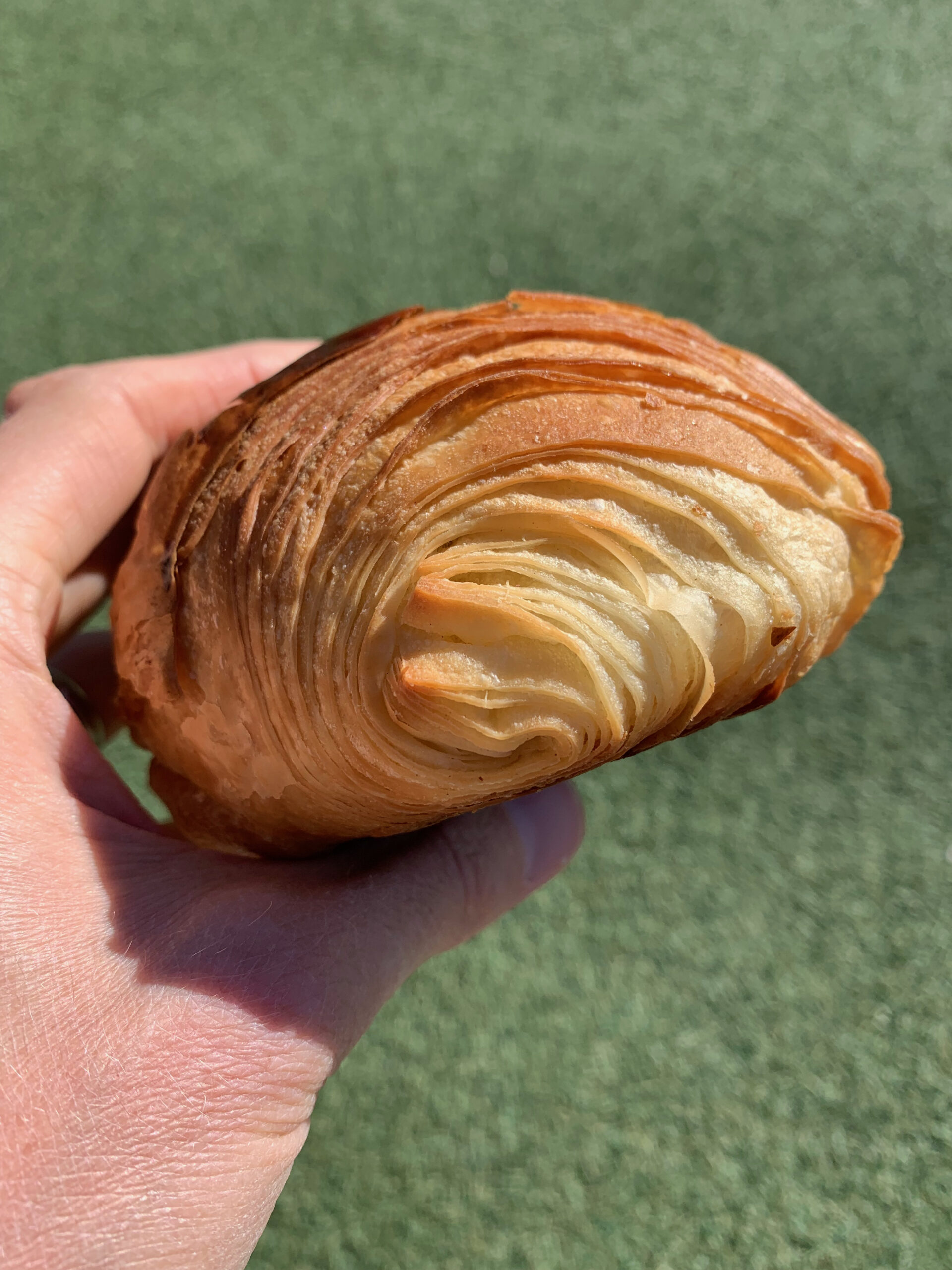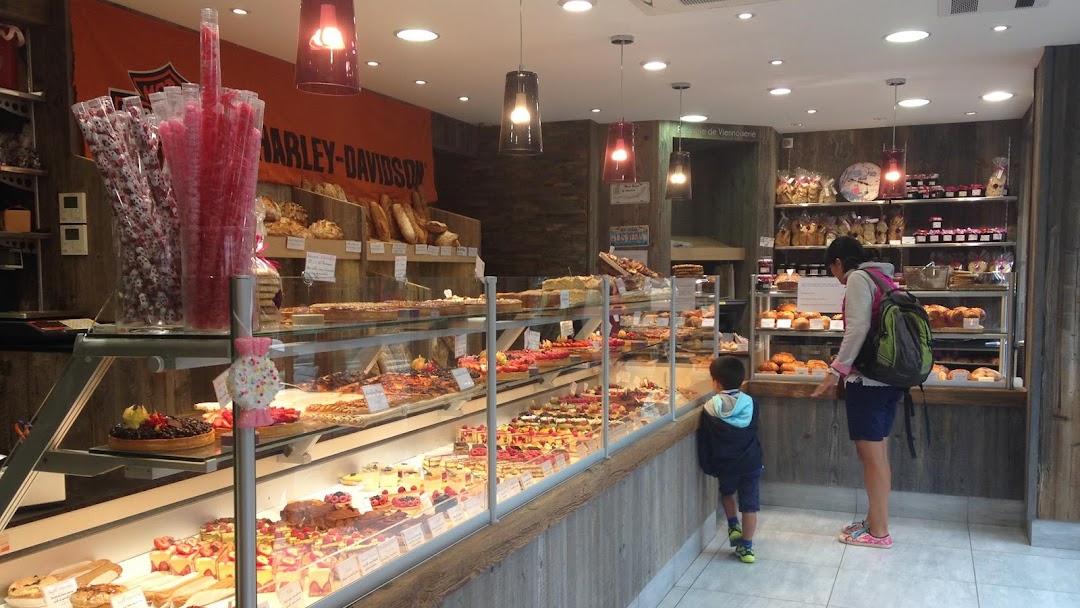“Wow that is such a good pain au chocolat” – me
“It is because we are an artisan bakery” – the baker
And that is how I fell down the bakery investigation rabbit hole! Perhaps the easiest place to start is what is not an ‘artisan bakery’.
In France 80% of pastries/viennoiseries are industrially manufactured, brought frozen by bourangeries and reheated on site. However there is a law In France, Le Décret Pain (The Bread Decree), that helps you identify when this is happening.
‘Point du pain’
This is somewhere like a local supermarket that cooks bread from frozen. A ‘Point du pain’ is not allowed, by law, to use the name ‘Boulangerie’ punishable by a fine of up to €37,500 and/or imprisonment for up to two years. An additional penalty can be applied of disqualification for a maximum of 5 years.
‘Boulangerie’
Using the name ‘Boulangerie’ is subject to special conditions defined by decree. A ‘Boulangerie’ must
- knead the dough
- ferment the dough
- Shape the dough
- Bake the bread at the point of sale to the final consumer
Pastries however can still be frozen.
‘Artisan Boulanger’
A further decree specifies that people who claim the status of ‘artisan’ must be qualified or have professional experience in the trade of at least three years. In addition, once the professional qualification has been obtained, the ‘artisan’ must register with the Chamber of Trades and Crafts and follow further training.
As well as being trained or experienced an artisan baker must additionally select the raw ingredients
This is a small but key difference that completely changes the flavour of the bread because a ‘Boulangerie’ can buy premixed raw ingredients e.g a bag of flour already mixed with salt, yeast etc Pastries can still be frozen.
‘Boulanger de France’
A charter to protect traditional bakeries from industrial bakeries, finally non-frozen fresh baker-made pastries!
The ‘Boulanger de France’ must additionally adhere to the following codes of conduct
- Viennese pastries, pastries and snacks must be made on-site and marked with a B!
- Bread must be made with low-intensity kneading and long fermentations
- The dose of salt used to make the bread must not exceed the recommendations of ANSES (National Agency for Food, Environmental and Occupational Health Safety) of 18 g/kg of flour.
- Prioritise seasonal products and short supply chains
- Donate fresh unsold produce to charities and sort waste
- Advise customers and answer their questions according to the craftsmen’s tradition of hospitality and courtesy
- Undertake to offer people with disabilities good accessibility or, failing that, implement alternative accessibility solutions
- Make available to customers a list of allergens present in the recipe
- Welcome apprentices, pass on skills and know-how to prepare them to become a ‘Boulanger de France’ in turn
- Defend the artisan bakery against all forms of industrial baking and train customers to distinguish themselves from one another

In conclusion
I don’t think any visitor to France ever had a baguette and did not enjoy it, however I feel it is important to know a bit more about what you are consuming. ‘Point du pain’ bread is by its nature is homogenised and ingredients under less scrutiny. Like my friend who works in food, development says ‘if you want to make anything taste great add sugar, salt and butter/fat’ and you can be sure of more of these in your goods from here.
I have had some great Pain au chocolats, from artisan bakeries, like La Bonbonnière here in Morzine (their bread is exceptional) as is the bread from our artisan bakery who we work with Chez Celine, La Tavernier’s pain au chocolates are of note too. They may come from frozen, however, they use different suppliers and the difference in oven counts for a lot.
We are also lucky enough to have 2 ‘Boulanger de France’ in our area Boulangerie Pâtisserie de L’Abbaye in Abondance and Boulangerie Pâtisserie REIBEL where you are in for a treat.
If you staying in France you can find a list of all of the ‘Boulanger de France’ here https://www.boulangerdefrance.org/ou-nous-trouver
Happy hunting, bon appetit.
Dom
Further bread bants
- Croissant means ‘crescent’
- Croissant and Pain Au Chocolat are collectively referred to as Viennoise in France on account of the Croissant’s predecessors of Austrian heritage – from Vienna.
- The French consume 320 baguettes every second – an average of half a baguette per person per day, 10 billion every year.
- The difference between pain and baguette is size/weight.
- The word baguette means ‘wand’, ‘baton’ or ‘stick’
- There is a competition every year in Paris to find the best bakery. The winner of ‘Le Grand Prix de la Baguette’ has the honour of seeing its bread served every day at the Palais de l ‘Élysée. The baguette is rated on 5 categories – la cuisson (baking), l’aspect (appearance), l’odeur (smell), le goût (taste) and la mie (crumb).
P.s for the blog savvy. I am an A- grade vegetarian, as in a good one and B+ grade vegan foiled mainly by pain au chocolat!
If you like food as we do please do check out our catered chalets food page and come stay with us in one of our Morzine catered chalets
References
https://www.mapa-assurances.fr/boulangerie/appellation-artisan-boulanger
https://tasteoffrancemag.com/trending/how-to-find-a-true-french-bakery/amp/
https://www.bbc.com/travel/article/20190825-the-perfect-french-baguette
